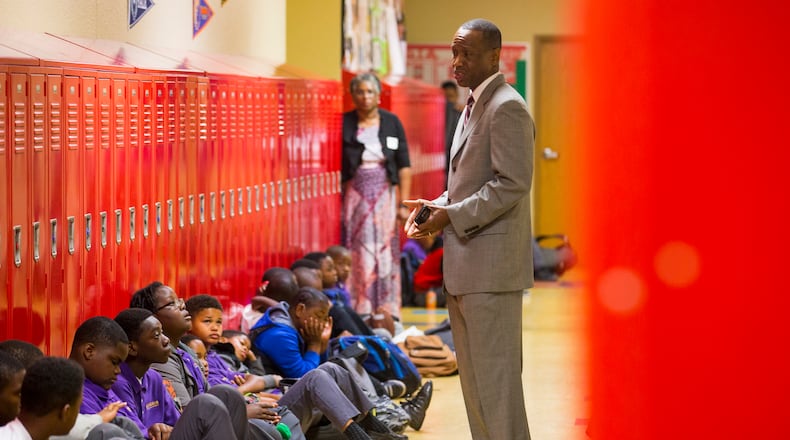The Genesis Innovation Academy, a single-gender experiment housing girls and boys in different buildings, separated by a playground, won't see immediate double-digit gains in reading and math, or miraculous grade improvements among its students.
It’s frustrating, founder Gavin Samms said recently.
The culture change Samms had hoped for, alongside academic proficiency increases, was evident: Suspensions are almost nonexistent, and student engagement has improved steadily over the schools’ first year.
“My expectation was that the academic would be impacted as well,” he said.
Samms’ hypothesis — that separating black young men from black young ladies and teaching them the same lessons from different perspectives will have positive outcomes — has been tried and proven before. Experts and those who have been in his shoes said progress happens over time, however, and that some struggle, when working to shift mindsets, is par for the course. Success of single-gender programs, they said, depends on the motive and the steps taken to achieve it.
The Genesis schools, with about 380 students in kindergarten through sixth grade, opened last summer, authorized by the State Charter School Commission. They are on Atlanta’a Southside, just beyond Interstate 20 off Moreland Avenue, south of East Atlanta Village.
Separating children by gender for better educational outcomes is being seen more often lately in public schools, after years of private schools specifically for boys or girls. A handful of Georgia schools aim specifically to educate boys or girls. Greene County decided to separate its 3,300 students by gender 10 years ago. Greene schools received a grade of C for the past three years on the annual report card from the Governor's Office of Student Achievement.
“I think leaders of single-sex schools will tell you it’s a culture shift and it takes a lot of time and work to produce success,” said Jeanne Allen, CEO of the Center for Education Reform, a nonprofit charter school advocacy group. “I’m a huge fan of providing environments like this for kids who don’t have the access to this, because the benefit it provides. You don’t have the distractions and the pressures. There are certain things you can expect of girls separately, that you can expect of boys separately.”
Studies about single-gender education lay out many positives from the experience, from better individualized learning for boys and girls to reducing distractions in classes. Those against it argue it could hurt students as they return to mixed-gender society.
Samms said his schools also will avoid lowered expectations put on students of color in education environments. Researchers Seth Gerhenson, a public policy professor at American University, and Nicholas Papageorge, an economics professor at Johns Hopkins University, told EducationNext last year that white teachers are significantly less optimistic about their black students’ chances of receiving a four-year degree. White teachers expect 58 percent of their white students to earn a bachelor’s degree, but only 37 percent of their black students.
Shawn Hardnett, founder of the KIPP Polaris Academy for Boys in Houston, said singling out black students puts them in an environment with educators who come there wanting to see successful outcomes.
"It's very apparent that (students) can pick up on the fact that their teachers have a negative set of emotions about them," said Hardnett, who is opening the single-gender North Star College Prep Academy for Boys, a middle school in Washington D.C., this summer. "It has a traumatic impact on their performance overall. Quite naturally, the teachers who come to that space like black and brown boys. That can significantly impact outcomes."
KIPP Polaris’ first year saw 25-point gains in match and reading, and suspensions all but went away.
“We were doing restorative justice before we knew that was the name for it,” he said, referring to the drop in suspensions. (“Restorative justice” practices emphasize interacting with students to understand the underlying causes of disciplinary problems.)
“All that said, if you’re not going to do the work – figuring out how to make it for them – that’s not enough.”
Genesis’ boys academy was the right fit for Constance King’s son, Lynden Carter. Often, she said, she was meeting with administrators at his previous school for fighting and other behavioral matters. His grades suffered greatly, she said. She saw Samms’ methods were different immediately.
“The first time he got in trouble, for doing something he shouldn’t have been doing, they talked to him,” she said. “They were more concerned with getting to the root of the problem. I think that’s the moment he realized they cared. That’s when I realized they cared.”
Lynden’s grades and behavior have changed dramatically over the course of the year, King said. And he’s interested in what he’s learning.
“My son thought Georgia was a country or something ridiculous,” she said with a chuckle. “Once recently, he had to do a map of Latin America. He could pick out all the countries and rivers. This is someone who … barely made it out of fifth grade in Fulton County (Schools), to As and Bs.”
Andrea Harris said her 9-year-old, Johnna-Marie, is at the age where she is starting to pay attention to boys. The Girls Academy has allowed her to stay focused on her lessons instead. An educator herself, Harris said she’s concerned that other schools are not putting more emphasis on some of Genesis’ core principles and parent engagement.
“Genesis has been a blessing to my daughter, and my family,” she said. “Curriculum-wise, I’m very pleased with how they push the students to think out of the box. And they’re trying to bring (parent involvement) back to society, because it was lost a long, long time ago. I think it’s good because most parents want schools to raise their children.”
Next year, Genesis will expand to include seventh grade, retaining the students who graduated this year. For the second year, Samms said his goal is to continue down a path that establishes an environment for black students with fewer disruptions and better student outcomes.
“We’ve got a lot of work to do,” he said.
One day recently, several prospective parents were taking a tour of both schools. In a corner on the top floor of the Girls Academy, several students from an engineering class were testing cars they made for an assignment. The cars were powered by balloon air. Two women in the group remarked on how the children were engaged, and how assignments at their childrens’ current schools did not appear to be as rigorous.
“Yep,” one of the women said. “We’re enrolling.”
Schools offering single-gender education in Georgia
Atlanta Girls’ School
Benedictine Military School, Savannah
B.E.S.T. Academy (male students), Atlanta
Genesis Innovation Academy for Boys, Atlanta
Genesis Innovation Academy for Girls, Atlanta
Coretta Scott King Young Women’s Leadership Academy, Atlanta
St. Vincent’s Academy, Savannah
Pinecrest Academy, Cumming, private school with separate classes for boys, girls
Greene County — separates its approximately 3,300 students between classrooms by gender
About the Author
Keep Reading
The Latest
Featured



